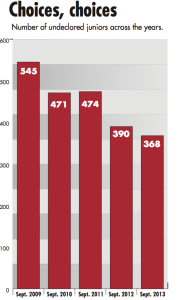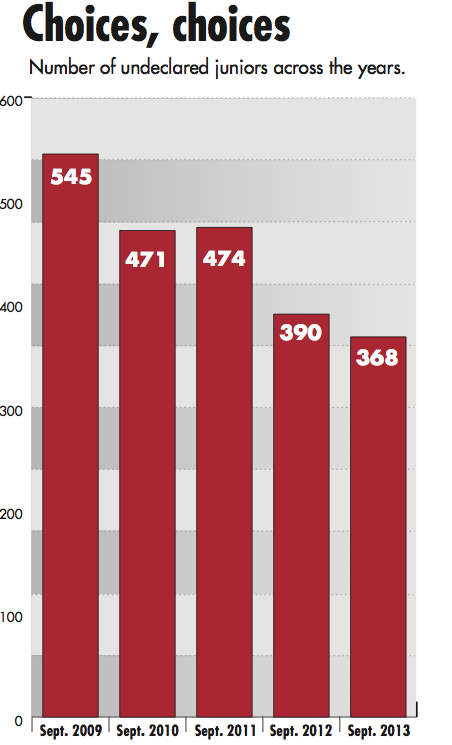
The number of undeclared juniors at the start of the academic school year has steadily decreased over the last five years.
In September 2009, 545 juniors remained undeclared. In 2010, this number decreased to 471, and in 2011, 2012 and 2013, there were 474, 390 and 368 undeclared juniors, respectively.
Kirsti Copeland, associate dean of residentially based advising and pre-major advising, said the decline was due in part to the Undergraduate Advising and Research (UAR) advisor hold (ADV20) that prevents freshmen and sophomores from signing up for their next quarter classes before meeting with their pre-major advisors.
In an email to The Daily, Copeland stated that the advisor hold was established with the intention of driving down the number of undeclared students. The hold led to decreasing numbers because students would see their pre-major advisors and have a designated time in which to think through their academic decisions such as a declaring.
According to UAR Academic Director Dayo Mitchell, some students enter junior year undeclared though they know what they want to study; yet, they are unsure how to navigate the declaring process, have not yet fulfilled the course prerequisites for their major or have not found their major advisor.
Dina Hassan ’15 declared in history two weeks ago after her own struggle to declare.
“It was really hard for me to decide because I really wanted to explore,” Hassan said. “When it came to spring sophomore year, I met with my academic director. I knew I wanted to declare history, but I didn’t know who to pick for my advisor.”
Hassan said that another quarter helped her get to know faculty in the department better and be confident in her choice. Hassan added that her declaring was later than some of her peers because she had been strongly considering both history and computer science before making a final decision.
“It takes a while to know what CS actually is, so I took those classes to find out if it was for me or not,” Hassan said. “I wanted to be really sure I picked the best fit for me, and I am.”
Aside from ADV20, the UAR also places a hold on student records and the ability to enroll in classes for juniors that are still undeclared.
UAR Associate Dean Randall Williams stressed that this relatively new policy—instated five years ago—is not intended to force students into declaring if they really are unsure about what they want to study. Instead, the policy aims to prompt those who have decided on their majors but have not gone through the formal declaring process yet and to help those who are still uncertain about their majors.
“All we want is contact from the [undecided] student to give us an update on where they are in their process. All we want to know is that they’re thinking about it and working on it,” Williams said. “And we’re happy to move a hold to give them the time to engage with the department and figure things out.”
Some undeclared students, however, harbor frustration towards this hold policy.
Breanna Hampton ’15 decided in spring quarter that she would declare in psychology, but has been having trouble finding an advisor and therefore has not been able to declare.
“It’s making me really stressed out because I have to get classes for next quarter,” Hampton said. “It’s not cutthroat to take classes like in other schools but at the same time it’s a hassle to email teachers to ask them to put you on their waiting list, especially when it’s so late in the game.”
Hampton cited that the academic directors she talked to were helpful to some extent, sitting down with her to discuss a plan that would allow her to graduate on time, but she is worried about not being able to take the classes she needs because of the hold.
“I understand [the policy], I really do, but it’s really frustrating,” Hampton said. “It’s aggravating. I don’t care if you hold my grades. I don’t care if you hold anything else. I need to get classes. I understand they want to get you to declare; I’ll do all the talking and paperwork, but I just really want to make sure I’m in the class I want to be in.”
Williams stressed that choosing a major is typically an extended process that begins with one’s interests coming into Stanford and matching each freshman with a pre-major advisor. Sophomore year is an appropriate time for Majors Night, an annual event designed to help students explore over 45 departments.
“It’s really about information gathering, referrals, experiences and taking courses,” Williams said. “You can figure it out by talking with peers and talking with departments to help you narrow it down.”
For those students still deciding between multiple majors, Mitchell recommends talking to faculty and peer advisors, researching what majors are wanted by careers of interest and outlining potential four-year plans, all to get a better sense of what completing a major would look like.
“One of the things I encourage is to not wait for a light bulb but to go out and gather information about the major,” Mitchell said. “If you get all this information and it doesn’t put you off then I think you can safely decide you’re ready, as opposed to just expecting
As of Monday earlier this week, 178 juniors remain undeclared.
Ileana Najarro and Catherine Zaw contributed to this report.
Contact Sarah Moore at smoore6 ‘at’ stanford.edu.
